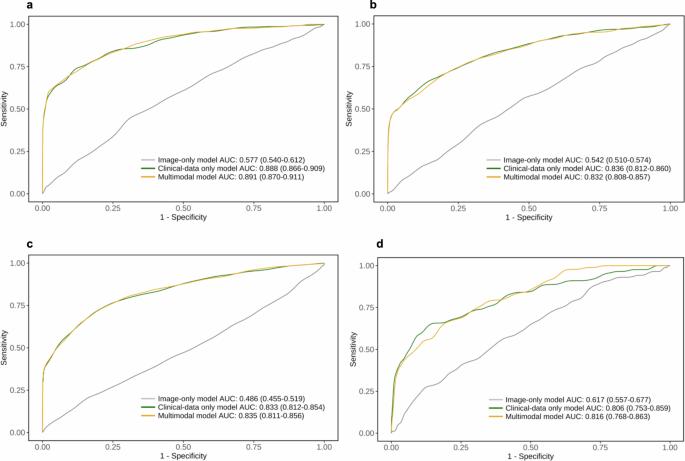利用机器学习模型识别不太可能从全膝关节置换术中受益的人群。
IF 12.4
1区 医学
Q1 HEALTH CARE SCIENCES & SERVICES
引用次数: 0
摘要
识别并预防不太可能从全膝关节置换术(TKA)中长期获益的患者,将大大减少医疗开支。我们在 5720 名膝关节 OA 患者中训练了机器学习(ML)模型(仅图像、仅临床数据和多模态),以预测术后 2 年的不满意度。不满意度的定义是术后膝关节协会膝关节和功能评分(KSS)、短表-36 健康调查[SF-36,分为身体部分评分(PCS)和精神部分评分(MCS)]以及牛津膝关节评分(OKS)未达到最小临床重要差异。与纯图像模型相比,纯临床数据模型和多模态模型在用 AUC(纯临床数据模型)测量的不满意度预测方面均表现出色:KSS为0.888(0.866-0.909),SF-PCS为0.836(0.812-0.860),SF-MCS为0.833(0.812-0.854),OKS为0.806(0.753-0.859);多模态模型:KSS 0.891(0.870-0.911)、SF-PCS 0.832(0.808-0.857)、SF-MCS 0.835(0.811-0.856)和 OKS 0.816(0.768-0.863)。我们的研究结果表明,使用临床或多模态数据的 ML 模型能够预测 TKA 术后的不满意度。本文章由计算机程序翻译,如有差异,请以英文原文为准。


Identifying who are unlikely to benefit from total knee arthroplasty using machine learning models
Identifying and preventing patients who are not likely to benefit long-term from total knee arthroplasty (TKA) would decrease healthcare expenditure significantly. We trained machine learning (ML) models (image-only, clinical-data only, and multimodal) among 5720 knee OA patients to predict postoperative dissatisfaction at 2 years. Dissatisfaction was defined as not achieving a minimal clinically important difference in postoperative Knee Society knee and function scores (KSS), Short Form-36 Health Survey [SF-36, divided into a physical component score (PCS) and mental component score (MCS)], and Oxford Knee Score (OKS). Compared to image-only models, both clinical-data only and multimodal models achieved superior performance at predicting dissatisfaction measured by AUC, clinical-data only model: KSS 0.888 (0.866–0.909), SF-PCS 0.836 (0.812–0.860), SF-MCS 0.833 (0.812–0.854), and OKS 0.806 (0.753–0.859); multimodal model: KSS 0.891 (0.870–0.911), SF-PCS 0.832 (0.808–0.857), SF-MCS 0.835 (0.811–0.856), and OKS 0.816 (0.768–0.863). Our findings highlighted that ML models using clinical or multimodal data were capable to predict post-TKA dissatisfaction.
求助全文
通过发布文献求助,成功后即可免费获取论文全文。
去求助
来源期刊

NPJ Digital Medicine
Multiple-
CiteScore
25.10
自引率
3.30%
发文量
170
审稿时长
15 weeks
期刊介绍:
npj Digital Medicine is an online open-access journal that focuses on publishing peer-reviewed research in the field of digital medicine. The journal covers various aspects of digital medicine, including the application and implementation of digital and mobile technologies in clinical settings, virtual healthcare, and the use of artificial intelligence and informatics.
The primary goal of the journal is to support innovation and the advancement of healthcare through the integration of new digital and mobile technologies. When determining if a manuscript is suitable for publication, the journal considers four important criteria: novelty, clinical relevance, scientific rigor, and digital innovation.
 求助内容:
求助内容: 应助结果提醒方式:
应助结果提醒方式:


